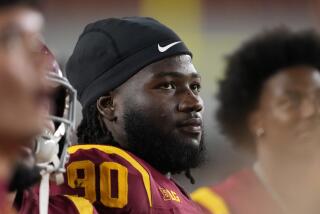Alexander Enters Presidential Ring
- Share via
NASHVILLE — Former Tennessee Gov. Lamar Alexander formally launched his second presidential bid Tuesday with a pledge to overcome widespread cynicism and restore public faith in government by improving the nation’s schools and renewing respect for a scandal-scarred White House.
On a sodden, gray day in his adopted hometown, Alexander spoke of the sun rising on a “new American century” that would “require a moral foundation laid by a president who respects the office and respects those who put him in the office.”
“This election will be about the character of the nation and its institutions,” Alexander declared at the ceremonial start of a quest for the GOP presidential nomination that, for all intents, began six years ago and never ceased. “This election will be about restoring respect to the presidency.”
Standing before a backdrop of furled American flags in a marble-columned chamber of the Tennessee capitol, Alexander, 58, ticked off three priorities that would guide his administration: improving public education, cutting taxes while protecting Social Security, and strengthening national security through establishment of a missile-defense system.
But with the impeachment trial of President Clinton serving as a broader backdrop, Alexander repeatedly returned to the themes of personal honesty and public integrity.
Candidate Pledges to Unify Nation
“I believe that the cynicism and the rancor that swirl about our public institutions today is not a permanent affliction,” he said. “Rather, I think it is a temporary condition that can be washed away by a leader who is willing to unite us, rather than divide us.”
Having run longer than any other Republican in the 2000 field, Alexander is still striving to find some spark to distinguish his candidacy. He begins with many of the strengths that marked his 1996 run: a talented team of advisors, an active network of supporters in the key states of Iowa and New Hampshire and a credible national fund-raising base.
Moreover, as Alexander pointed out in a pre-announcement interview, “I’ve been around the track.” Clearly trying to deflect criticism that his is a shopworn endeavor, he noted that President Eisenhower “is the last Republican to be elected the first time he ran” for president.
His rivals, he added, “are either untested or less tested.”
But with Texas Gov. George W. Bush and former Red Cross President Elizabeth Hanford Dole running well ahead in the polls and generating broad enthusiasm within the GOP as they tiptoe toward the race, the case for Alexander’s candidacy remains a difficult one for him to make.
“The race is wide open,” he insisted Tuesday.
Alexander ran a respectable race in 1996 when Sen. Bob Dole (R-Kan.), Elizabeth’s husband, captured the Republican nod. After a solid third-place showing in the Iowa caucuses, Alexander finished a few thousand votes shy of Patrick J. Buchanan and Dole in the New Hampshire primary--a whisker-thin margin that spelled the difference between a surge to the front and Alexander’s elimination a few weeks later.
Despite that near-miss, Alexander’s most innovative achievement was not his policy pronouncements or issues agenda but rather his introduction of casual wear to the campaign trail. He stumped in a red-and-black flannel shirt and a pair of scruffy work boots--the same common-man uniform he adopted in his first successful race for Tennessee governor--even incorporating the checkerboard pattern on bumper stickers and campaign signs.
This time, Alexander has traded in his dress-down duds for more standard-issue apparel, such as the somber charcoal business suit he wore Tuesday.
“I’d like people to remember my message,” he said in the interview, “more than my shirt.”
But it was symbolism that helped launch Alexander’s career as an elected official in the first place.
Born in east Tennessee, on the front porch of the Great Smoky Mountains, Alexander attended law school in New York City and served as a congressional and White House aide before returning home in 1970 to help elect the state’s first GOP governor in 50 years.
When he ran for governor himself four years later, Alexander found little market for his brand of pin-striped Republicanism. So after losing by a landslide, Alexander refashioned his image by donning a lumberjack shirt and sauntering 1,022 miles across Tennessee, playing trombone and accompanied by a washboard band. He won the 1978 contest in a walk.
During two terms as governor, Alexander acquired a reputation as a problem-solving pragmatist, one of the new breed of successful New South governors that included Bill Clinton in neighboring Arkansas.
He was highly successful in luring new business to Tennessee, somewhat less so in overhauling the state’s education policy. Along the way, Alexander proved willing to raise taxes to improve roads and help fix the state’s school system.
After a term as president of the University of Tennessee, Alexander joined the Bush administration as Education secretary. In that post, he supported a strong federal role in education policy, in contrast to his current calls for giving power back to states.
After Bush lost his 1992 reelection race to Clinton, Alexander returned to Nashville and effectively has sought the White House ever since, pausing only briefly after Dole clinched the 1996 GOP nomination.
With his plain-vanilla persona and a center-right political message, Alexander’s greatest challenge will be finding some defining issue or other means to set himself apart from the rest of the candidates crowding the GOP center.
Since losing four years ago, he seems to have made little headway establishing himself outside a narrow circle of political activists in such places as Iowa and New Hampshire, where he has set up virtual residence.
“If you ask what Lamar stands for, I have no idea, other than the fact he’s been running forever,” said one veteran GOP strategist who is backing a rival candidate. “He hasn’t done or said anything that’s engaging.”
A recent poll by the Pew Research Center for People and the Press in Washington illustrated Alexander’s dilemma. The nationwide survey found that only 42% of registered voters had heard of him. And of them, fully 60% said that they would not consider voting for him.
A Call to Cut Education Bureaucracy
With his 25-minute speech Tuesday, delivered with conviction but little emotion before a crowd of about 200 supporters, Alexander sought to provide his candidacy some rhetorical robing.
The former governor essentially came full circle, returning not just to the capitol where he had served but to the education issue that was one hallmark of his eight years in office.
He called for slashing the federal education bureaucracy and shipping more money--and control--to the state and local levels. He also proposed an $1,800-per-student tax credit to help low- and middle-income parents pay for their children’s elementary and secondary education.
“As president, I would lead a movement, state by state, to transform our public schools,” Alexander said. “To pay good teachers more. To support teachers who maintain discipline, instead of suing them. To end teacher tenure so that we can make certain that no child is made to be in a classroom with an incompetent teacher.
“Our schools can be the best in the world. . . . What is missing is the political will so they can put in the practical reforms that will make it happen.”
To boost family incomes, Alexander called for abolition of “death”--or inheritance--taxes, eliminating the tax on capital gains and ending the so-called marriage penalty that hurts some dual-income couples.
He called for vastly simplifying the federal tax code by applying just two rates--15% or 28% to individual incomes--and proposed tripling the per-child tax deduction to $8,000.
On defense issues, he called for establishment of a missile-defense system and creation of a new branch of the armed services to man the U.S. border and seek to stop the importation of illegal drugs.
In his only reference to foreign policy, Alexander took a swipe at the Clinton administration’s open-ended dispatch of peacekeeping troops around the world.
As president, he said, “before I send American forces abroad, I will make sure that there is not only an ‘exit’ strategy, but a ‘success’ strategy.”
Hear Times political writer Mark Z. Barabak’s audio analysis of Lamar Alexander’s candidacy and access updated reports on Elizabeth Hanford Dole’s expected announcement of her presidential exploratory committee on The Times’ Web site: https://www.latimes.com/politics
(BEGIN TEXT OF INFOBOX / INFOGRAPHIC)
Profile: Lamar Alexander
* Born: July 3, 1940, in Blount County, Tenn. His parents were local school teachers.
* Education: Undergraduate degree, Vanderbilt University, 1962. Law degree, New York University, 1965.
* Career highlights: Legislative assistant to Sen. Howard H. Baker Jr. (R-Tenn.), 1967-69; aide to White House congressional liaison in Nixon administration, 1969-70; governor of Tennessee, 1979-1987; president of the University of Tennessee, 1987-91; secretary of Education in Bush administration; 1991-93.
* Family: Married to Leslie B. “Honey” Alexander, four children.
* Quote: “If we are going to bring out the best in America, we will need a president who talks straight--and who listens. A new American century will require a moral foundation laid by a president who respects the office and respects those who put him in the office.”
More to Read
Sign up for Essential California
The most important California stories and recommendations in your inbox every morning.
You may occasionally receive promotional content from the Los Angeles Times.














